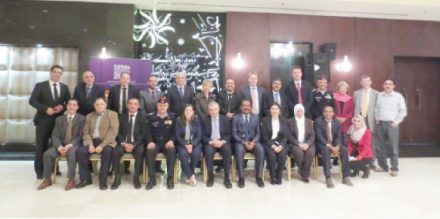Regional Experts’ Meeting on the UN standard Minimum Rules for the Treatment of Prisoners in Jordan

Experts from nine countries met in Amman today (7 November 2013) to discuss the review the Standard Minimum Rules for the Treatment of Prisoners (SMR).
The outcomes, which will be summarised in a paper (the ‘Amman paper’), will feed into the current discussions at UN level on updating outdated areas of the UN Standard Minimum Rules for the Treatment of Prisoners in order to reflect recent advances in correctional science and best practices.
PRI Middle East and North Africa Regional Director, Taghreed Jaber, said that PRI has taken the initiative to organise a workshop in order bring in the perspective and expertise from the Arab side into the ongoing revision process.
Ms Jaber said that over the last fifty-five years, since the adoption of the SMR, the world has witnessed a remarkable development of human rights and good prison management, and several areas are no longer compliant with current international human rights standards.
The ‘Amman paper’ will reflect on the importance of applying the rules with no discrimination on grounds of race, colour, sex, language, religion, political or other opinion, national or social origin, property, birth or other status, as well as on the allocation of prisoners, to the extent possible, to prisons close to their homes or places of social rehabilitation. It will capture the experts’ emphasis on written information being provided to every prisoner upon admission about the regulations governing the treatment of prisoners of his category, the disciplinary requirements of the institution, complaints procedures, and all such other matters as are necessary to enable him to understand both his/her rights and his/her obligations and to adapt to the life of the institution.
The provision of healthcare to prisoners was also discussed in the meeting, as well as rehabilitation and reintegration of prisoners and aftercare contributing to lower recidivism rates.
The experts emphasised the application of the UN Bangkok Rules for the Treatment of Women Prisoners and Non-Custodial Measures for Women Offenders, in particular with regard to alternatives to imprisonment, taking into account the gender specificities of, and giving priority to non-custodial measures to women in conflict with the law for minor, non-violent offences.